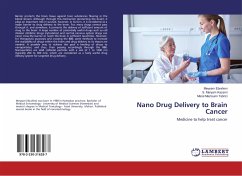
Nano Drug Delivery to Brain Cancer
Medicine to help treat cancer
Versandkostenfrei!
Versandfertig in 6-10 Tagen
24,99 €
inkl. MwSt.

PAYBACK Punkte
12 °P sammeln!
Barrier protects the brain tissue against toxic substances flowing in the blood stream. Although through this mechanism (protecting the brain), it plays an important role in survival, however, in its turn, it is considered as a major barrier to drug delivery to the brain. For, many drugs cannot pass through it, and somehow, it prevents the delivery of sufficient amount of drug to the brain. A large number of potentially useful drugs such as cell division inhibitor drugs (cytostatics) and central nervous system drugs can never cross the barrier or reach the brain in sufficient quantities. Howev...
Barrier protects the brain tissue against toxic substances flowing in the blood stream. Although through this mechanism (protecting the brain), it plays an important role in survival, however, in its turn, it is considered as a major barrier to drug delivery to the brain. For, many drugs cannot pass through it, and somehow, it prevents the delivery of sufficient amount of drug to the brain. A large number of potentially useful drugs such as cell division inhibitor drugs (cytostatics) and central nervous system drugs can never cross the barrier or reach the brain in sufficient quantities. However, for therapeutic purposes and crossing the BBB, some methods to increase the availability of drugs within the brain and drug delivery to its tissues are needed. A possible way to achieve this goal is binding of drugs to nanoparticles, and thus, their passing accordingly through the BBB. Nanoparticles are solid colloidal particles with a size of 1 to 1000 nm (typically 200 to 300 nm), which are considered as a fairly useful drug delivery system for targeted drug delivery.












